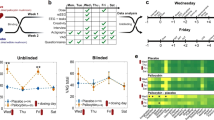Abstract
The effect of caffeine intake on weight loss maintenance has not been examined in humans. We compared the daily consumption of coffee and caffeinated beverages between 494 weight loss maintainers and 2129 individuals from the general population controlling for sociodemographic variables, body mass index and physical activity level. Weight loss maintainers reported to consume significantly more cups of coffee and caffeinated beverages compared with the participants in the general population sample. Thus, consumption of caffeinated beverages might support weight loss maintenance. Further studies should investigate possible mechanisms.
This is a preview of subscription content, access via your institution
Access options
Subscribe to this journal
Receive 12 print issues and online access
$259.00 per year
only $21.58 per issue
Buy this article
- Purchase on Springer Link
- Instant access to full article PDF
Prices may be subject to local taxes which are calculated during checkout
Similar content being viewed by others
References
Je Y, Giovannucci E . Coffee consumption and total mortality: a meta-analysis of twenty prospective cohort studies. Br J Nutr 2014; 111: 1162–1173.
O'Keefe JH, Bhatti SK, Patil HR, DiNicolantonio JJ, Lucan SC, Lavie CJ . Effects of habitual coffee consumption on cardiometabolic disease, cardiovascular health, and all-cause mortality. J Am Coll Cardiol 2013; 62: 1043–1051.
Ding M, Bhupathiraju SN, Chen M, van Dam RM, Hu FB . Caffeinated and decaffeinated coffee consumption and risk of type 2 diabetes: a systematic review and a dose-response meta-analysis. Diabetes Care 2014; 37: 569–586.
Lopez-Garcia E, van Dam RM, Rajpathak S, Willett WC, Manson JE, Hu FB . Changes in caffeine intake and long-term weight change in men and women. Am J Clin Nutr 2006; 83: 674–680.
Greenberg JA, Axen KV, Schnoll R, Boozer CN . Coffee, tea and diabetes: the role of weight loss and caffeine. Int J Obes 2005; 29: 1121–1129.
Westerterp-Plantenga MS, Lejeune MP, Kovacs EM . Body weight loss and weight maintenance in relation to habitual caffeine intake and green tea supplementation. Obes Res 2005; 13: 1195–1204.
Mayr A, Gefeller O, Prokosch HU, Pirkl A, Fröhlich A, de Zwaan M . Web-based data collection yielded an additional response bias—but had no direct effect on outcome scales. J Clin Epidemiol 2012; 65: 970–977.
Feller S, Müller A, Mayr A, Engeli S, Hilbert A, de Zwaan M . What distinguishes weight loss maintainers of the German Weight Control Registry from the general population? Obesity 2015; 23: 1112–1118.
Craig CL, Marshall AL, Sjöström M, Bauman AE, Booth ML, Ainsworth BE et al. International physical activity questionnaire: 12-country reliability and validity. Med Sci Sports Exerc 2003; 35: 1381–1395.
Gavrieli A, Karfopoulou E, Kardatou E, Spyreli E, Fragopoulou E, Mantzoros CS et al. Effect of different amounts of coffee on dietary intake and appetite of normal-weight and overweight/obese individuals. Obesity 2013; 21: 1127–1132.
Dulloo AG, Geissler CA, Horton T, Collins A, Miller DS . Normal caffeine consumption: influence on thermogenesis and daily energy expenditure in lean and post obese human volunteers. Am J Clin Nutr. 1989; 49: 44–50.
Schubert MM, Hall S, Leveritt M, Grant G, Sabapathy S, Desbrow B . Caffeine consumption around an exercise bout: effects on energy expenditure, energy intake, and exercise enjoyment. J Appl Physiol 2014; 117: 745–754.
Rustenbeck I, Lier-Glaubitz V, Willenborg M, Eggert F, Engelhardt U, Jörns A . Effect of chronic coffee consumption on weight gain and glycaemia in a mouse model of obesity and type 2 diabetes. Nutr Diabetes 2014; 4: e123.
Acknowledgements
The study was supported by a grant from the German Federal Ministry of Education and Research (BMBF, 01GI0835) within the German Competence Network of Obesity. AH was supported by grant 01GV0601 (BMBF).
Author information
Authors and Affiliations
Corresponding author
Ethics declarations
Competing interests
The authors declare no conflict of interest.
Rights and permissions
About this article
Cite this article
Icken, D., Feller, S., Engeli, S. et al. Caffeine intake is related to successful weight loss maintenance. Eur J Clin Nutr 70, 532–534 (2016). https://doi.org/10.1038/ejcn.2015.183
Received:
Revised:
Accepted:
Published:
Issue Date:
DOI: https://doi.org/10.1038/ejcn.2015.183
This article is cited by
-
Nutritionist and obesity: brief overview on efficacy, safety, and drug interactions of the main weight-loss dietary supplements
International Journal of Obesity Supplements (2019)



